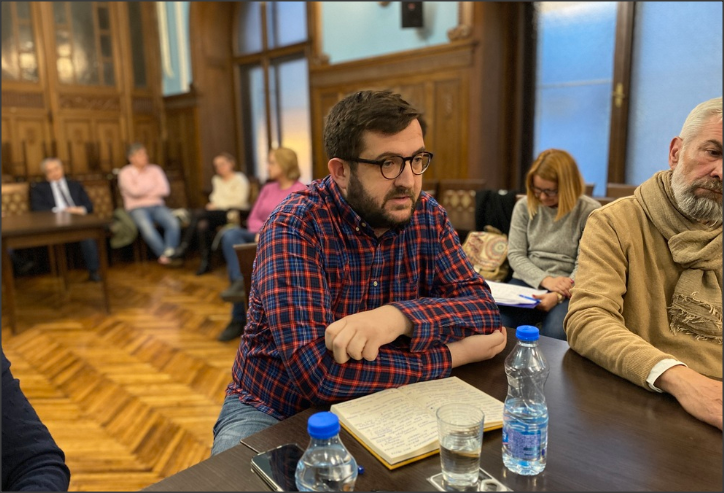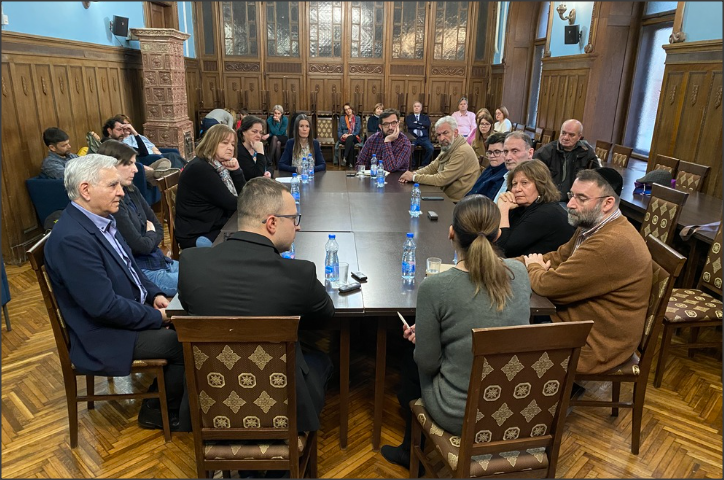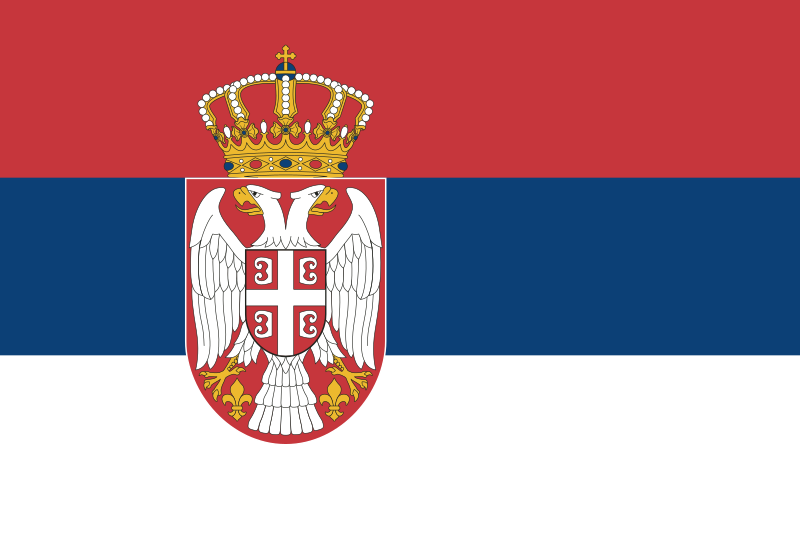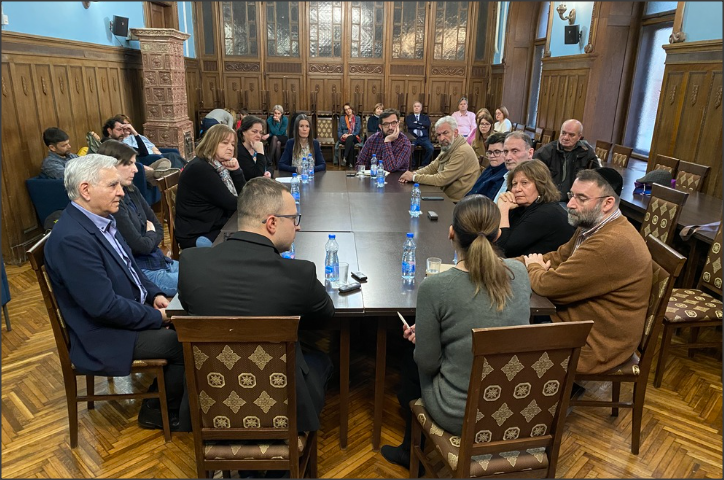On Thursday, March 30, the Jewish municipality of Subotica hosted a round table “Subotica in passing: Multicultural policies and intercultural perspectives”, whose participants agreed that the city lacks, first of all, an urban space that would be a gathering place for young people of different nationalities, and then all those groups that do not find their social niche in Subotica today.
The guest of the round table was Aleksandra Đurić Bosnić from the Novi Sad Center for Intercultural Communication (CINK), and sociologists Branislav Filipović and Jasminka Dulić, youth worker Žofija Hulo, ethnologist-anthropologist Viktorija Šimon Vuletić, historian Rudolf Weiss, art historian Nela participated in the round table. Tonković, president of the Center for Local Democracy (LDA Subotica) Stanka Parać, secretary of the Jewish Municipality of Subotica Robert Kovač, president of the Roma Educational Center Stevan Nikolić, and city chronicler and former director of the Subotica City Library Dragan Rokvić. The conversation was moderated by journalist Boris Shuman.
The presenter of the round table, Aleksandra Đurić Bosnić from the Center for Intercultural Communication (CINK) from Novi Sad, stated that today she really sees Subotica as a “passing city” because people do not know each other, passing by each other.
“The chance for Subotica to be a place of intercultural dialogue has been greatly missed in recent years.” We managed to return to our public space all those ghosts of the 90s, all those ideological matrices that fatally destroyed the cultural space of Serbia and Vojvodina. We missed the transformation of the educational and cultural system,” she stated.
Hence, in the kind of society we live in, Đurić Bosnić assesses, we talk more and more often about tolerance, and not about mutual closeness and mutual knowledge.

And as the essential interest in communication was lost in Subotica, the Council for the Preservation of Intellectual Heritage of Radomir Konstantinović, of which she was a member, also disappeared, which, as she assessed, is one of her last memories related to this city.
“We are mostly concerned with the protection of the majority culture, and when it comes to different ethnic and religious communities, they are deliberately put in a humiliating position in the sense that they are given some of the resources, pieces of some kind of influence, which do not lead to fundamental changes in society.” Đurić Bosnić believes.
It is also devastating, she added, that different young people in Subotica do not have a place to gather.
“Basically, Subotica is a wonderful city that has a lot of diversity in it, it has every right to have open cultural spaces, open media, that no one determines which guests will be on certain television shows, that successful directors of institutions are not replaced by diktat because they are politically ineligible. And that can be applied to all cities,” she said.
She told the decision-makers to stop immediately all variants of populist leadership of cultural policy and politics in general, and to make an effort to respect basic democratic values, which is important for the development of the city:
“To open cultural institutions and public spaces for all citizens without selecting them according to the principle of suitability, to nurture high culture, the one that is needed by different target groups.” The defeat of any politics and any culture is when you have to search for free places to organize different events – that means something is wrong”.
In front of the Center for Local Democracy (LDA Subotica), which in 2007 initiated and then participated in the submission of Subotica’s candidacy for obtaining the status of an intercultural city, Stanka Parać Damjanović pointed out that Subotica has enough capacity, non-governmental associations, intellectuals, who with a great deal of understanding they recognize this topic as a need.
“In addition to local self-government, civil society organizations, youth, formal and informal groups, today actually participate in the process of educating citizens for active citizenship. “Today, if a citizen wants to be active, regardless of which minority community he belongs to, he must be very informed and know the normative framework that all decision-makers adhere to,” said Parać Damjanović.
In her opinion, the unused potential is the Council for Interethnic Relations of the city of Subotica as a formal body that should be in the function of opening space for public debate and for the equal participation of all citizens regardless of differences, and what should be insisted on in the future.
Interculturality is a matter of spirit
Sociologist Branislav Filipović believes that interculturality is not a question of festivals, languages or some spaces, but is primarily a question of the spirit.

“If we solve the issue of the spirit, everything else will come naturally. On the other hand, if there really is tolerance in Subotica, I am interested in how the new cultural figure of the immigrant who is a threat to Subotica, to white Christianity, circulates through public speech. We all know that it was a few years ago when certain priests in this city declared that immigrants are not welcome, that they should be shown the way back. Are we really such a tolerant society? That policy of intolerance is only pacified enough for us to reproduce a contradictory life in the everyday sense,” said Filipović.
According to his opinion, interculturality is one of the highest categories of freedom, and change can be achieved, he stressed, paraphrasing Lenin, only if we change our assumptions about our own changes.
“For years now, we have had a constitutive violence of the ethnos itself as a category of life organization. We must have some side of our dark pleasure in that eternal separation which is maintained here. I can’t rationalize in any other way what makes us passionately submit to that subjugation, obedience, and separation and distancing from each other,” concluded Filipović, adding that by calling for intolerance towards another human being, we are actually obscuring the essential problem of social existence itself.
The president of the Roma Educational Center, Stevan Nikolić, who has been involved in the inclusion of the Roma community for more than 30 years, said that all national minorities are almost in the same situation, and that the degree of development of the community is viewed based on how well they can convey the message about their needs.
“The degree of development of the community is seen with its power to send a message, to realize its needs. If the community is active and if it communicates, that’s the only way to reach a common solution and change,” he said, stressing that inclusion is a change in the habits of all of us.
“The Roma community has a very bad past, although in the meantime it has gained the opportunity to be more visible in the community. Roma also have different national and territorial affiliations, and we still have people who do not have personal documentation,” Nikolić drew attention to one of the problems that this community faces in the 21st century.
As an example of good practice that exists in Subotica, he singled out the magazine “Mozaik”, which is jointly edited by 10 national minorities and is published in seven languages, and through which it can be seen that all minority communities have some hidden problems of their own.
Young people without space, youth workers without jobs
Youth worker Žofia Hulo graduated from the university in Szeged and returned to Subotica six years ago because, as she says, she wanted to change something because she saw even then that there was no place for young people to gather.
“I’m still trying today, I’ve knocked on all the doors, I’ve done everything, but no one wants to listen to me that young people today need a common place to gather.” I’m afraid, because my generation has already left here. “We don’t have time anymore, and often we only talk about problems, but nothing is done to change it,” said Hulo.

Today, youth workers in Subotica have nowhere to work, because there is no adequate space for young people, she added, recalling the closed youth club “Kerulj Be” that she ran herself, which successfully brought together young people of different nationalities, which was not possible for many before. by hand.
“When they found themselves in a common space, I was delighted because they communicated in English.” Young people today do not speak the languages of the environment because schools do not allow them to do so. And it also happens that young people who come from a mixed family hide that they speak both languages. The biggest problem is that these problems are not talked about enough, but young people don’t do it either,” Hulo believes.
Sociologist Jasminka Dulić is also of the opinion that the city government should respect the fact that Subotica is a multi-ethnic, multilingual, multi-religious environment, its history of coexistence.
“It all boils down to these human rights, and basically, community and common life are missing. “Interculturality and multiculturalism are increasingly becoming phrases that no one knows what they actually mean,” said Dulic, adding:
“In Subotica, there are several national councils that by law should take care of or participate in decision-making on culture, information, use of language and education. When it comes to intercultural policies, I don’t see how the city will realize these rights in the future”,
“The government should treat us like citizens”
Art historian Nela Tonković told the decision makers in Subotica “to treat us as if we are all citizens first”.
“From trying to enter the freedom of learning, of being, of fellowship, we moved to the dark pleasure of separation.” No one mentioned that Subotica has a place where we can meet people with autism, as no one thought that interculturality is something that is not only related to ethnicity – for me, this is what is the sore point of our work,” said Tonković.
When we talk about interculturality and multiculturalism, we consciously exclude certain groups that we are not used to as groups that are different from what is the majority or dominant culture, such as the migrant population, Tonković added.
She said that it would be good if representatives of the public sector and the City Administration were also present at this round table.
“Besides boasting the number of festivals and diversities that are not gathered anywhere except probably in the magazine ‘Mozaik’, what is the effort to publish it from issue to issue, where can ethnic communities meet? Also, where are the young people? Nowhere,” said Tonković.
Historian and president of the German People’s Association in Subotica, Rudolf Weiss, also appealed to the local government to open a youth cultural center that will offer young people urban amenities such as rock concerts, exhibitions, a library, a comic book store…
Despite the perceived shortcomings, he believes that Subotica is still a champion of tolerance.
“At one time, I came to Subotica because I was bewitched by the inhabitants and the spirit of this city. Where else can 10 national communities gather and create a magazine in seven languages? We only have that here! We have things to be proud of,” said Weiss.
The city chronicler and former director of the Subotica City Library, Dragan Rokvić, drew attention to certain words used in public discourse, which remind him of the 90s, which he clearly remembers: the dominance of nationalism, homogenization, pressure on journalists, judicial processes, bans, million-dollar fines for inappropriate media, criminalization of society, daily violence, violence from assembly speakers, pollution of the public sphere, mobilization, buses, rallies…
“At the moment, there are a lot of paradigms that are incredibly associated with those years. Almost the majority of people from the 90s are still actors on the public stage, their vocabulary and manner of expression have not changed a bit,” he said, adding that “we have been twisting the same topics for years, namely ghettoization, confinement within national frameworks, which we are still going through today”.
Subotica also lacks something like the Artists’ Club, believes ethnologist-anthropologist Viktorija Šimon Vuletić, because, she believes, it is not important that people meet not only by generation, but also by interests.
“Mingling places, as young people call them, are slowly closing, places where young people of different generations can meet depending on their interests. We need to have spaces where these urban contents are more present, where both young and old can meet,” she stated, adding that many young people have not yet acclimatized and that the city still does not feel like their own.
“We still haven’t found models of how to create a new generation for the people of Subotica. It is best for every political party to divide people and have their own voting body,” said Šimon Vuletić, but she also reminded that Subotica still has a large number of mixed marriages, which is proven by the statistics that show that more than 20,000 people are not ethnically stated.
“Culturally, we no longer have a common umbrella, we began to cling to identities from the 19th century, there was no longer a way to find a common denominator for the new generations.” We don’t care about people, which is especially visible in recent years,” said Šimon Vuletić, adding that the greatest multiculturalism is actually visible at the flea market, where people are forced to work together, and that it is least present in the City Hall.
Regarding the observation that young people who hide from speaking the languages of the environment, the secretary of the Jewish Municipality of Subotica and professor Robert Kovač said that he personally has the opposite experience, stating that those students who know two languages are very popular and that they are the ones who make a connection in certain situations , gather the society, bring the spirit into that society, and free those who know to some extent, but are not allowed to speak.
Also, he notes, the people of Subotica perceive the Jewish Synagogue as a symbol of the city and part of their culture and tradition, their heritage.
“We are aware that little is known about the Jewish community, but we consider ourselves a multiple minority community, because we are very few in number. Secondly, there is multilingualism within our community, the traditions are different, but we are very proud that the people of Subotica and others who visit the Synagogue feel some positivity and that through this restored building they have some connection with the spirit of those people who left our generation this miracle,” he said. Kovac, saying at the end of the round table:
“Barriers between us can be broken down only if we understand each other.” We need to speak the other’s language because then we don’t live next to each other, but live together”.
The round table “Subotica in passing: Multicultural policies and intercultural perspectives” was held as part of the “Me in other people’s shoes” project, which the Magločistač portal implements in partnership with the Croatian Cultural and Educational Society “Matija Gubec” from Tavankut as part of the program of the Belgrade Open School “Young and media for democratic development”, with the support of the Kingdom of Sweden.


